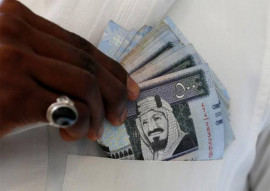
With Islamabad looking for every possible revenue stream to reduce fiscal deficit, the LDI [long distance international] Group says it can make a significant contribution to the cash-strapped economy if supported by the federation.
“If we’re supported, we can help increase tax revenue significantly,” a representative of the LDI Group told a group of journalists last week.
A consortium of 14 LDI operators, the group had met with immense criticism in the media after it formed the controversial International Clearing House (ICH) – a centralised telecom gateway meant for terminating all international calls landing in Pakistan.
The representatives of the LDI industry, now ICH, had always shied away from media. The group, however, came up with data to support their performance post-ICH and seek government’s support for the continuation of their work.

“The ICH revenues added $1 billion in cash to the national economy during 18 months, ending March 2014,” an LDI official said, highlighting their performance since the establishment of ICH in October, 2012. This translated to an estimated income tax of $184 million during the period, he said. The contribution to the Universal Service Fund amounted to Rs17 billion for post-ICH period, he added.
If supported, the ICH has the potential to bring in $1 billion every year, officials say. The LDI segment’s monthly revenue is $44 million, and that’s despite the fact that 50% of total international calls to Pakistan are made through grey channels.
“We bring in $1.5 million in cash every night. If grey traffic is controlled this amount will double, increasing tax revenues,” said the official.
On every single minute terminated by the ICH, the LDI Group contributes 19.5% in GST to the national kitty. This is in addition to a 30% corporate income tax they pay on their profits.
The LDI segment is an important revenue stream for the government, officials say and can help in reducing the fiscal deficit and increasing the country’s dollar reserves.
As agreed with the International Monetary Fund (IMF), the government will raise Rs120 billion in the next fiscal year by imposing new taxes in the upcoming budget to reduce fiscal deficit by one percentage point to 4.8%.
Why the ICH became controversial?
Critics of ICH argue that by forming this cartel, the industry increased call termination charges from $0.02 to $0.08, encouraging grey traffic as opposed to its so-called agenda of curbing it. Grey traffic is smuggling-in of international calls through illegal channels that evade government taxes. It is also a security threat as such a call cannot be traced back.

The country’s total legal traffic was 1.9 billion minutes a month before ICH, which reduced to 900 million shortly after its formation. The legal traffic has now been reduced to 550 million minutes per month, as per latest estimates – over half of total international traffic is illegally terminated thus costing more than $1 billion a year to the exchequer.
If it weren’t for ICH, the legal traffic would be much higher, critics say.
The cartel was also accused of hurting the Pakistani expatriates, who critics say were forced to pay higher charges post-ICH – something the LDI group disagrees with, saying the expats were paying high anyway because of higher tariffs imposed by foreign telecom operators. The group maintains that raising or lowering the tariffs is PTA’s mandate and not the LDI operators.
The ICH was not formed overnight, an official said. Explaining, he said they had reduced their margins to compete with grey channels but that didn’t work as the latter reduced prices further.
“While working independently, we could not lower tariffs beyond the level regulated by the government,” he said. “We were bleeding money with each grey minute when PTA came to our rescue.”
The government charged high taxes thus made our services expensive and failed to control grey traffic at the same time. “How could one expect us to compete with grey channels who evade all taxes?”
Since the ICH, the LDI operators have already contributed $30 million to PTA for buying grey traffic monitoring equipment. This is in addition to $10 million they contributed pre-ICH.
“We have millions on stakes and should be supported,” said an official – it costs between $60 million to $500 million to set up an LDI business depending upon the services and infrastructure of the operator.
Going forward
Responding to a question, the LDI Group spokesman said, “If we offer better rates to our partners, mobile operators whose SIMs are used in grey telephony, this could help control this menace.”
Currently, LDI segment pays a lesser amount to mobile operators than what grey channels offer. The PTA has advised LDI operators and mobile operators to enter an agreement for revenue-sharing through mobile termination rate.
Published in The Express Tribune, May 13th, 2014.
Like Business on Facebook, follow @TribuneBiz on Twitter to stay informed and join in the conversation.
COMMENTS (7)
Comments are moderated and generally will be posted if they are on-topic and not abusive.
For more information, please see our Comments FAQ

1732868310-0/BeFunk_§_]__-(72)1732868310-0.jpg)
1732869272-0/diddy-(47)1732869272-0-165x106.webp)














Our govts should find other spots to catch the fish in the river. Problem is; if you creat a very large net you loose future growth of fish population due lack of breeding opportunity but if you control fish traveling and movement the fish genetically is programmed to either discontinue breeding & multiplying and start to die(...calling home to send money). Now if they loose touch with family members they will just spend money elsewhere on someone else maybe. Trick is which of their money you want? "Call" to loved ones or the "Check" to loved one? Make you choice! Be Wise!
FIA, and corresponding Interpol, UN, multi-lateral agencies, NSA, and other agencies are enough to detect the money laundering, tax evasion and related issued which are now exposed by the Swiss Banks for their secrecy for the ill earned/gotten money every where in the world. If this is stopped/checked Pakistan will turn a green heaven in the world surpassing, Dubai, Panama etc. Our authorities if they want can do all possible, provided there is any will
And to block the grey traffic PTA is blocking IPs, VPNs. and so IT Industry is suffering badly. And Pathetically they have issue an 100 rupees stamp paper, stamp by notary public to register VPN. They don't have bird eye view, and could not stop it ever.
@Ejaz: So your argument is that there is an international cartel of these telcos? Cartels are bad period. Saying there is an even larger cartel than we thought is not a good argument to make if you are trying to convince us of the innocence of these companies.
This is a loosing game that they are playing. Instead of wasting time and money trying to protect this monopoly of theirs they should admit that technology has made it cheaper to communicate internationally. 3G and 4G will make that technology available to even more people in Pakistan. It is better if these telcos spent time and money on improving internet services instead of these rent seeking practices.
Dear GP65, please be advised that today from most of the GCC (65% of Pakistan's expats lives in GCC) retail tariff calling home for Bangladesh, India, Pakistan, Sri Lanka, Indonesia etc is same. Difference of termination rate is only pocket by Telecom operators of these countries and benefit is not transferred to callers. Also, all OTT are freely used in Pakistan they way it is in rest of the would.
. I (who live in US) regularly speak to my parents (who live in India) free on Skype and it is not considered grey or illegal, on days when the whole computer thing is not feasible, i speak to them on Viber which is also free. On days when Viber is not giving good call quality, i use Reliance and call home for 2 cents a minute at crystal clear quality.
All these modes of communication are legal in India but would be called grey and the recommendation being to curb them.
So in effect the additional $187 million that government gets in taxes by curbing 'grey traffic' is a tax on the poor laborers in Gulf who are trying to talk to their wives and kids whom they have left behind. In return they (the telecom cartel) get an extra billion dollars of marginal revenue.
Seriously? Who are they kidding?
Oh and these hard working laborers are sending far more than 187 million dollars of forex.